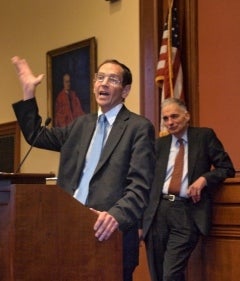The following story appeared in the March 1, 2010 edition of the Harvard Law Record.
The millennial generation has been called self absorbed, but also as deeply connected – thanks to new technology and a renewed willingness to trust its elders. But will those connections – and that respect – translate into participation in and concern for politics and the law?
Former presidential candidate and consumer advocate Ralph Nader ’58 and former Deputy Attorney General and FCC General Counsel Bruce Fein ’72 come from somewhat different places ideologically – Nader has been identified with the movement for consumer safety, while Fein thinks that an obsessive concern with safety at all levels hampers risk – but both agree that lax oversight has allowed government to run amok. Implicit in both their comments Tuesday, February 23, during a visit to Harvard Law School organized by the Harvard Law Record and Harvard Law Forum, was that the responsibility to change that rested on the current generation’s shoulders.
Fein, who is currently completing a book on the American “mentality of empire,” focused on the expansion of the executive branch and the creation of the “imperial presidency” – a force which gained considerable strength under George W. Bush and shows few signs, according to him, of abating under President Barack Obama ’91. Without greater concern about executive power, he warned, the War on Terrorism would continue to expand, as Obama’s troop surge into Afghanistan demonstrated. He also addressed the lack of oversight of Congress, and noted that he had created an organization, First Branch, devoted to citizen policing of the legislature.
Nader, a former editor of the Harvard Law Record whose recent novel “Only the Super-Rich Can Save Us!” appears to represent a bitter and cynical turn to the notion that politics and civil society are so broken that billionaires are the only ones with the fortunes to make meaningful change, took on the political apathy that still plagues the United States. Particularly lamenting the sparse crowd that greeted the two prominent public figures, Nader condemned the “generation that doesn’t show up”.
Nader also used the occasion to tear into what he saw as the lack of commitment to the public interest at Harvard Law School. Excepting Elizabeth Warren, who leads Congress’ oversight of the federal bank bailouts, and a few other faculty members, Nader excoriated the faculty for shortsighted and stopgap solutions to public problems. And although he praised Dean Martha Minow for being what he believed was the first head of the school to assert that its purpose was “justice,” Nader lamented its continued commitment to teaching students to work in the service of corporations. Saying it was training future “greasers,” Nader emphatically pointed to the words of Minow and the content of the curriculum and declared that “Harvard Law School is a lie”.
